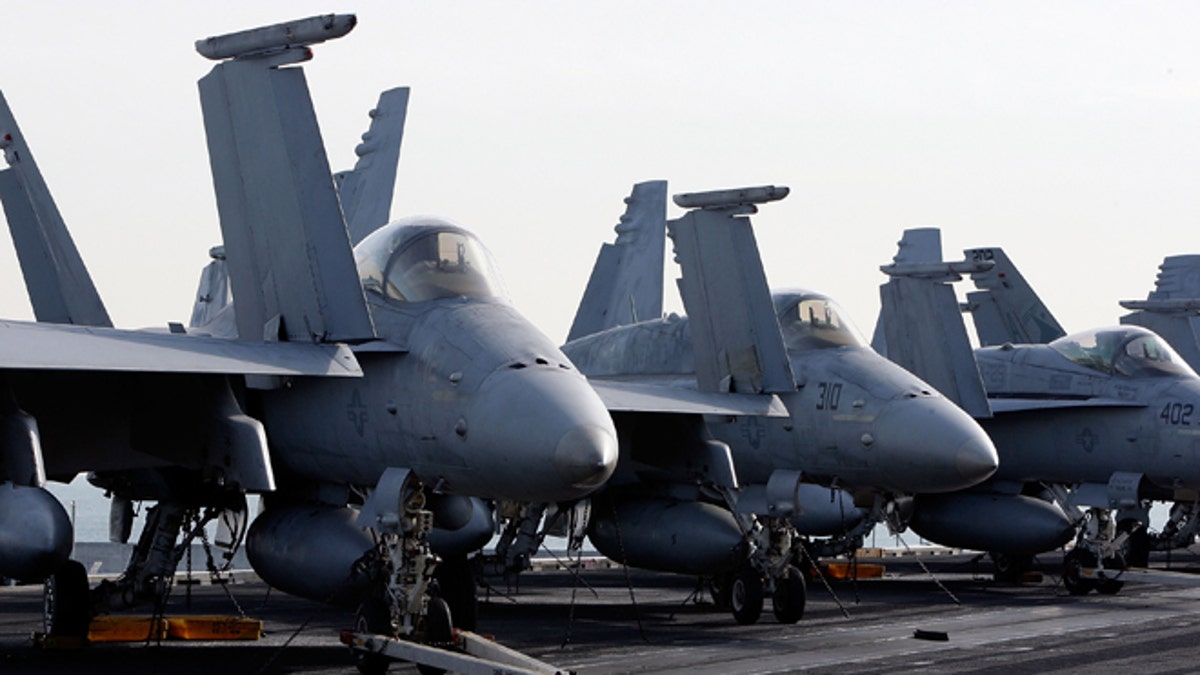
BUSAN, SOUTH KOREA - JANUARY 11: An F 18 Super Hornet aircraft on the flight deck of Aircraft Carrier USS Carl Vinson whilst at anchor in Busan port on January 11, 2011 in Busan. The USS Carl Vinson arrived in South Korea after participating in drills in East China Sea with Japan aimed at deterring possible attacks by North Korea and China. Tensions remain high in the Korean Peninsula following the shelling Yeonpyeong Island by North Korea last November. (Photo by Chung Sung-Jun/Getty Images) (2011 Getty Images)
Russian military officials are in Brazil this week trying to woo President Dilma Rousseff into letting them in on a bid for a multi-billion dollar fighter jet contract – a move that could scuttle a proposed deal with U.S. manufacturer Boeing and further strain relations between Washington and Brasilia.
Boeing made a $4 billion proposal to supply Brazil with F-18 fighter jets and was long expected to be the front-runner in a bidding war with Rafale by Dassault and Saab’s Gripen NG.
While Brazilian officials and the Russian delegation, headed by Defense Minister Sergei Shoigu, will sign a contract to send Russian-made Panzir-S1 air defense systems to Brazil, Russian and Brazilian media reported that the major reason for the visit is for Russian officials to convince the Brazilian government to consider a bid for its Sukhoi T-50 fighter jet.
The jet is currently in the final stages of development and would be in the bidding to replace Brazil’s aging fleet of Northrop F- 5 Tigers and the French-made Dassault Mirage 2000s.
While insiders in both Brazilian and U.S. military circles said that Boeing was the front-runner, there are rumors that controversy over the recent National Security Agency spying scandal in Brazil has thrown Boeing out of the top spot.
Officials from both the Brazilian and U.S. governments told Fox News Latino, however, that despite allegations that the NSA monitored communications between Rousseff and her aides, it will not affect the decision process in choosing the jets. The proposed deal by Boeing, part of the so-called F-X2 competition, is worth an estimated $4 billion and would send 18 fighter jets to Brazil.
“At this point it is still unclear if the NSA scandal will damage the F-18’s chances,” said Eduardo Frighetto, a spokesperson for the Brazilian embassy in Washington, D.C. “Right now, the jets are being judged solely on technical grounds, but it is too soon to tell.”
U.S. embassy officials in Brasilia downplayed the claims that the NSA scandal will rule Boeing out of contention, saying that the speculation is coming mainly from Russian news sources arguing Russia wants to open a new round of competition so its Sukhois can win the lucrative contract.
“They’re all on equal footing,” Dean Cheves, a spokesman for the U.S. embassy in Brasilia, told Fox News Latino. “As far as the U.S. government is concerned, we’re totally backing the sale of a U.S. product. We think that Boeing has the best overall package to offer Brazil.”
Boeing’s office in Brazil did not immediately respond to a request for comment. But its website mentions that the F-18 is still in contention for the F-X2 competition. Boeing opened its office in Brazil in 2011, but has sold military planes to the South American country since 1932.
“Currently, the Boeing F/A-18E/F Super Hornet is part of the F-X2 competition for the Brazilian Air Force’s planned purchase of 36 fighter jets,” according to Boeing’s website. “Boeing has already identified opportunities with more than 25 Brazilian companies to support the F-X2 industrial partnership program based on the specific technology requirements of the Brazilian Air Force.”
Russia’s foray into the Brazilian market is part of a greater push by President Vladimir Putin’s government to promote its arms industry in Latin America and other emerging markets. After Brazil, the Russian delegation will travel to Peru, where it will sign an arms supply contract totaling around $1.7 billion.
While Southeast Asia and the Asia-Pacific region are the largest buyers of Russian arms – about 43 percent – Latin America is becoming a major purchaser as well. Besides Brazil and Peru, Argentina and Mexico have expressed interest in purchasing Russian military assets.
Under the leadership of President Nicolas Maduro, Venezuela has continued its friendly relationship with the Eurasian nation that was fostered under the late Hugo Chávez.
“The Russians are very aggressively trying to expand into every market they can with their arms,” said Andrew Kuchins, the director of the Russia and Eurasia Program at the Washington D.C.-based think tank the Center for Strategic and International Studies. “A large and important economy like Brazil is a big opportunity for Russia.”
If Brazil does agree to put Russia’s Sukhois fighter jet in contention – or fails to choose Boeing in the F-X2 bid – the move could be seen as another snub against the U.S. by the Rousseff administration. The Brazilian president already cancelled a state visit to Washington in protest over the NSA scandal and, during her speech at the United Nations General Assembly, Rousseff blasted the U.S. and called the NSA spy program “a breach of international law.”
It was a tone that did not go unnoticed in terms of geopolitical implications.
“Brazil’s relationship with the U.S. right now is strained and they are very angry over the NSA scandal,” Kuchins said. “If they want to let the U.S. know their frustration, not buying the F-18s would be one way of expressing it.”
